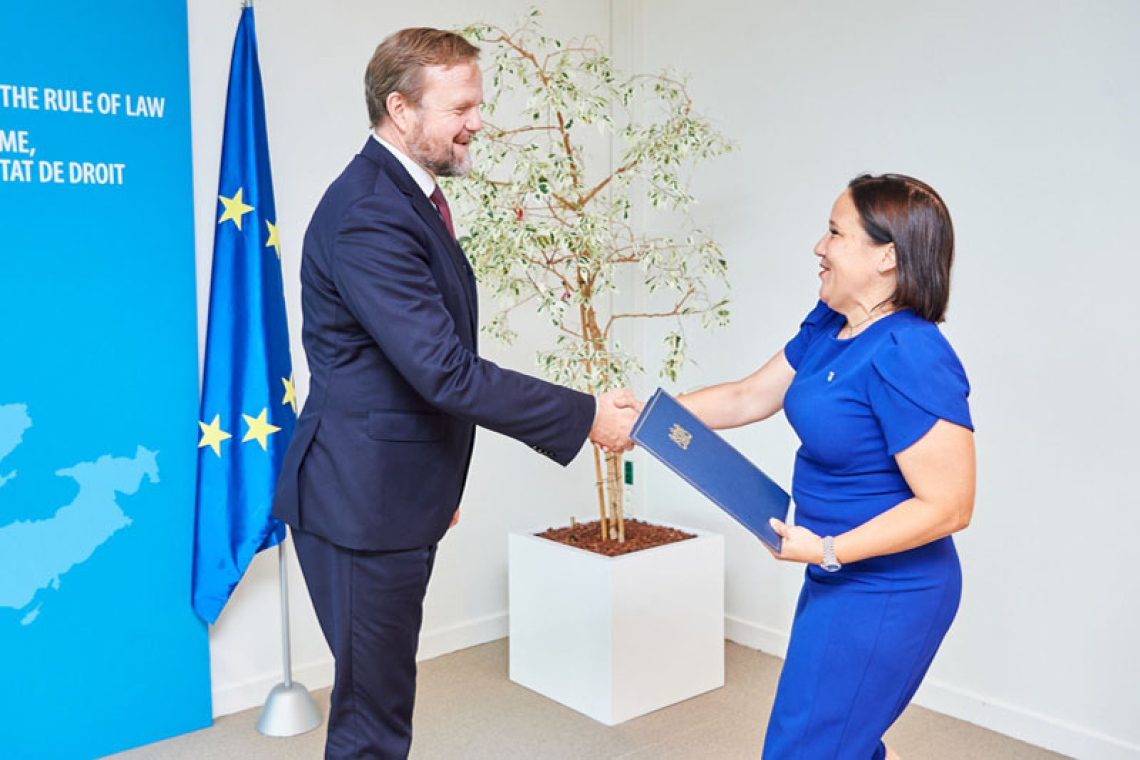As of Monday, July 1, Papiamentu is officially recognised in the European Netherlands under the European Charter for Regional or Minority Languages (ECRML). After a Dutch slavery exhibition at Palais de l’Europe in Strasbourg, the Declaration to the Charter was officially handed over to Deputy Secretary General of the Council of Europe, Bjørn Berge by Bonaire Commisioner Nina den Heyer.
STRASBOURG--As of Monday, July 1, Papiamentu is officially recognised in the European Netherlands under the European Charter for Regional or Minority Languages (ECRML). After a Dutch slavery exhibition at Palais de l’Europe in Strasbourg, the Declaration to the Charter was officially handed over to the Council of Europe.
Speaking Papiamentu is of great importance to speakers of the language in expressing their identity and culture, it was stated in a press release by the Dutch Ministry of Interior Affairs and Kingdom Relations. Therefore, it is important to protect Papiamentu for current and future generations of speakers. On Monday, an important step was taken in this regard by officially recognising Papiamentu in the European Netherlands under the ECRML.
On March 11, 2021, the then Minister of the Interior and Kingdom Relations signed The Papiamentu Administrative Agreement on Bonaire with the public entity Bonaire. This agreement states that Papiamentu is under increasing pressure from other languages and that this may eventually lead to an undesirable weakening of the language. Therefore, it was agreed with the Administrative Agreement that the process to recognise Papiamentu under the ECRML would be initiated, both on Bonaire and in the European Netherlands.
The ECRML is a Council of Europe convention for the protection of minority languages traditionally present in the territory of a European state. Recognition under the charter strengthens the position and status of the language. Applying the charter to Papiamentu recognises the value of the language for the identity and cultural experience of its speakers.
Recognition under ECRML is possible under Part II or Part III of the charter. A Part II recognition protects a language in a broad sense – a state must remove possible barriers to the use of a language from legislation. A language recognised under Part III of the charter must not only be protected but actively promoted. Under Part III of the charter there are agreements on the use of a language in, for example, education, legal traffic, administrative traffic, media and the cultural sector. In January this year, Papiamentu was recognised on Bonaire under Part III of the ECRML. Thus, children on Bonaire can be educated in Papiamentu and Papiamentu can also be spoken in the justice court on Bonaire.
In the European Netherlands, as of July 1, Papiamentu has been recognised under Part II of the charter. The Declaration to the Charter which establishes this was officially handed over to the Council of Europe on July 1, National Slavery Remembrance Day. The handover took place after the opening of an exhibition on the slavery past at the Palais de l'Europe.
The exhibition "Slavery. Ten True Stories of Dutch Colonial Slavery" was organised by the Permanent Representation of the Kingdom of the Netherlands to the Council of Europe. Also present were the public entity Bonaire and Fundashion Akademia Papiamentu.
According to Permanent Representative for the Kingdom of the Netherlands to the Council of Europe Tanja Gonggrijp: "These personal stories expose a story of dehumanisation, and at the same time a story of human dignity. History shows us the importance of respecting and promoting equality and valuing all; the foundation of all human rights and the core of the Council of Europe's work.”
After the opening of the exhibition, the formal presentation of the declaration took place to the Deputy Secretary General of the Council of Europe, Bjørn Berge.
Bonaire Commissioner Nina den Heyer emphasised the importance of the recognition under the charter. "Papiamentu is considered by many on Bonaire as a living monument to cultural identity and the longevity of survivors born from that dark chapter in our human history. Needless to say, for those who were born on or come from the islands, Papiamentu is an undeniable heritage, a foundation of culture, but above all, a much-loved language among native speakers and the diaspora. Let us not forget that every language, no matter how small, is a cornerstone of our shared human heritage. By protecting and celebrating endangered languages, we affirm our commitment to a Europe that values diversity, respects cultural differences and cherishes the myriad voices that contribute to its story."
To further the protection and promotion of Papiamentu, earlier this year at the signing of the Bonaire Administrative Agreement, the Ministry of Interior Affairs and Kingdom Relations made 1 million euros available to support the implementation of the Papiamentu Administrative Agreement on Bonaire.
The public entity Bonaire has indicated to use this extra impulse to set up a language institute. This language institute aims to offer support in the implementation of the Administrative Agreement on Papiamentu on Bonaire.







